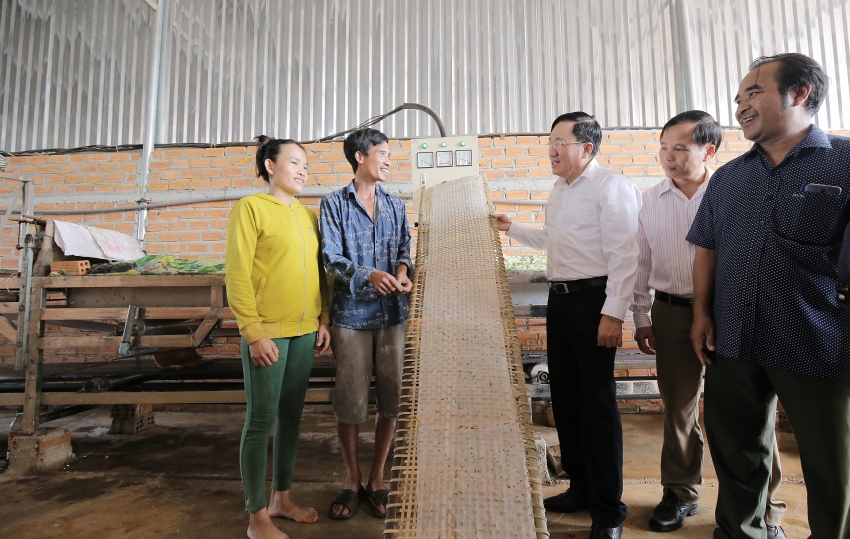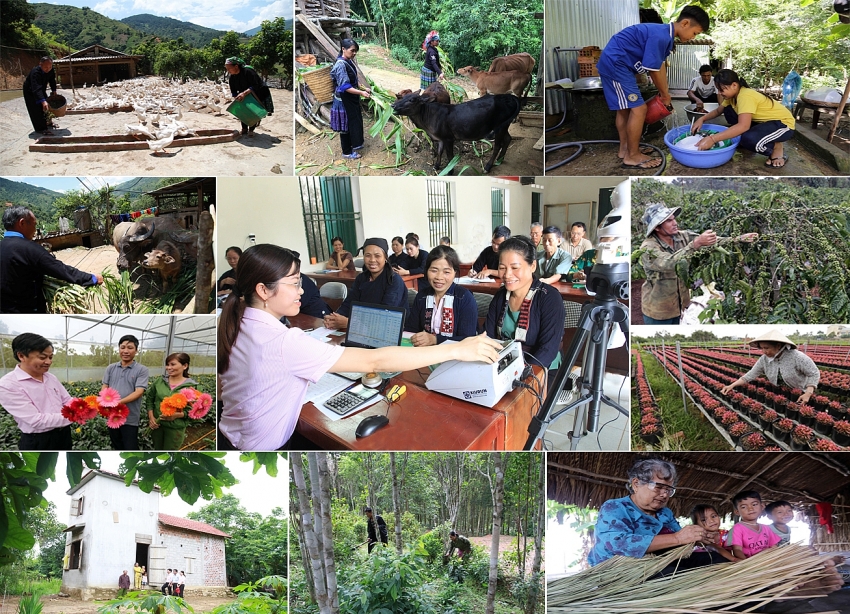VBSP lights up flames of love before the new year
These loving journeys were made with VBSP's spirit to embrace, cherish, and create a foundation for the poor to rise up against poverty and backwardness, to build a prosperous country with a just and civilised society.
 |
| General director Duong Quyet Thang visited Truong Thach Thao's family in Village 7, Ea Bar commune who took up policy credit to produce rice paper |
“We returned to Ea Bar commune, Buon Don district (Dak Lak) on an autumn day amidst the lush green of coffee, pepper, and cocoa," general director of VBSP Duong Quyet Thang looked back on Ea Bar five years ago, when many people lacked adequate livelihoods and were forced to burn charcoal, which caused heavy environmental pollution in the commune and surrounding areas.
The Chairman of Ea Bar Y Sen Kbuôr Commune People's Committee said that the commune has 3,669 households, of which ethnic minorities account for 36 per cent, living mainly from agriculture and husbandry.
In 2016-2020, the whole commune had 726 poor households, accounting for 20.52 per cent, and 486 near-poor households (13.74 per cent). Understanding this difficulty, the VBSP has co-ordinated with the party committees, commune authorities, and socio-political organisations to take entrusted loans to promote policy credit lending, creating conditions for poor households and other vulnerable groups to provide them with capital to start production and buy livestock to improve their lives and escape poverty.
Only in the first six months of this year, nearly VND12 billion ($521,740) was disbursed to 391 households. As of June 30, 2019, the balance reached nearly VND52 billion ($2.26 million) with 1,864 borrowers.
The VBSP delegation visited Truong Thach Thao's family in Hamlet 7, Ea Bar commune, one of the 23 disadvantaged households to receive gifts from the VBSP trade union awarded by the general director.
The credit policy not only helped his family overcome poverty but also helped him take up more preferential loans of VND50 million ($2,170) to buy rice paper-making equipment to expand production and create stable jobs for his family.
Even though the amount of the loans is still small, it is lighting the lives and aspirations of the poor. For example, Y Tam Adrong's family in Ea Bar commune used VND40 million ($1,740) borrowed from VBSP to overcome poverty and expand the coffee growing area. In addition, he loaned VND25 million ($1,090) from the funds for poor households to help his dream come true.
The credit policy contributes to reducing the commune's poverty rate each year by 3-5 per cent. By the end of 2018, there were only 441 poor households, accounting for 12.02 per cent and 421 near-poor households, accounting for 11.47 per cent.
Receiving gifts from VBSP, people like Truong Thach Thao and Y Tam Adrong felt even happier after VBSP supported the commune in perfecting medical facilities and working with the commune on the necessary investment and procurement for the parasite testing facility of the Ea Bar commune health station as well as investment in facilities to support Nguyen Hue primary school.
It is just one of the stories from the mission of a bank for the poor and especially from the heart of every VBSP staff. In the first nine months this year, 20 credit programmes from VBSP have been accessed by more than 1,620 thousand poor and near-poor households to escape poverty with a total loan turnover of VND54.98 trillion ($2.39 billion), focusing on poverty reduction and creating jobs. VND10.91 trillion ($474.35 million) of this went to lending to households that have newly escaped poverty, VND9.43 trillion ($410 million) was lent to near-poor households, VND7.31 trillion ($317.83 million) went to poor households, VND7.1 trillion ($308.7 million) to households in disadvantaged areas for production and business, while VND6.04 trillion ($262.6 million) was lent to create jobs.
By September 30, the total debt balance reached VND200.813 trillion ($8.73 billion), an increase of VND13.02 trillion ($566.1 million) or 6.9 per cent compared to the end of 2018, with more than 6.5 million of poor and near-poor households, as well as policy beneficiaries.
The ratio of overdue and frozen debts accounted for only 0.74 per cent of the total loan balance, also demonstrating that the quality of social credit policy is improving at a steady pace.
 |
| More than 6.5 million poor, near-poor households, and other policy beneficiaries are borrowing from VBSP |
Particularly in the first nine months of 2019, more than 1,620 thousand households have been granted preferential loans which contributed to creating jobs for more than 162,000 workers. More than 4,800 of these workers go to work abroad on a term contract, helping more than 12,000 students with difficult circumstances to take up loans to study.
In addition, VBSP programme has built more than one million works for water supply and sanitation, over 12,000 houses for poor households to stabilise their lives, and more than 3,000 social houses according to Decree No.100/2015/ND-CP.
Social credit policy has made an important contribution to effectively implementing the guidelines and policies set by the party and the state on sustainable poverty reduction, building new rural areas, focusing on human resources development, ensuring social security, political stability, defence, and socio-economic development.
Via this journey, VBSP will understand and run more charity and social security programmes to create more resources for sustainable poverty reduction. In 2015-2019, VBSP implemented social security activities for the community, with the amount of nearly VND121.8 billion ($5.3 million), of which the overall welfare programme of the whole system was VND63.57 billion ($2.76 million).
The rest are social security programmes launched by grassroots-level trade unions at provincial and district levels. Additionally, VBSP runs many support programmes that are both regular and timely to support the poor to overcome risks and difficulties caused by natural disasters, floods, and environmental incidents in the central provinces, northern mountainous areas, and South Central Vietnam.
The gifts are small but ensure that no poor household is left behind, making efforts to use credit policy capital more effectively and practically, thereby contributing to and achieving success.
In 2016-2018 poverty was reduced from 9.88 to 5.23 per cent (an average of 1.55 per cent a year) and the rate this year is expected to be 4.5 per cent. According to statistics, by the end of June 2019, 44 communes were removed from the list of coastal lowland communes. Of these, 42 communes have met the new rural standards. Eight poor districts have escaped from poverty and 14 took advantage of the Programme 30a to escape difficult economic situations.
Particularly, in ethnic minority areas, the poverty reduction rate exceeded 4 per cent, exceeding the national assembly's target outlined in Resolution No.69/2018/QH14 on the 2019 socio-economic development plan.
“It can be said that VBSP and its social credit policies are an important pillar of the national target programme on sustainable poverty reduction. Thanks to this pillar, in 2015-2018, the number of poor households decreased very quickly, contributing to pushing back and stopping informal credit, creating resources for localities to implement the national target programme on rural construction as well as sustainable poverty reduction associated with localities' projects on socio-economic development, improving the material and spiritual life of the people," Deputy Prime Minister Vuong Dinh Hue noted.
However, the poverty reduction achievements are not entirely sustainable as still a high proportion of escapees fall back into poverty. In addition to the recent report of Ministry of Labour, Invalids and Social Affairs, the high incidence rate of poor households (up to 17.8 per cent in the first six months), that is 18 of every 100 households escaping poverty fall back in time.
The percentage of poor households in poor districts or communes with extreme difficulties as well as ethnic minority areas is still over 50 per cent, at some places reaching up to 70 per cent. This also shows that channelling credit into poverty reduction is still arduous.
Hopefully, with the continued implementation of Directive No.40-CT/TW, the credit policy will spread more widely to support the poor to rise and step on the path of economic development, sustainability, and integration.
What the stars mean:
★ Poor ★ ★ Promising ★★★ Good ★★★★ Very good ★★★★★ Exceptional
 Tag:
Tag:
Related Contents
Latest News
More News
- Spring Fair 2026 boosts domestic demand (March 02, 2026 | 16:30)
- Law on Investment takes effect (March 02, 2026 | 16:21)
- Ho Chi Minh City attracts nearly $980 million in FDI in early 2026 (March 02, 2026 | 10:57)
- Businesses bouncing back after turbulent year (February 27, 2026 | 16:42)
- VinaCapital launches Vietnam's first two strategic-beta ETFs (February 26, 2026 | 09:00)
- PM sets five key tasks to accelerate sci-tech development (February 26, 2026 | 08:00)
- PM outlines new tasks for healthcare sector (February 25, 2026 | 16:00)
- Citi report finds global trade transformed by tariffs and AI (February 25, 2026 | 10:49)
- Vietnam sets ambitious dairy growth targets (February 24, 2026 | 18:00)
- Vietnam, New Zealand seek level-up in ties (February 19, 2026 | 18:06)



























 Mobile Version
Mobile Version